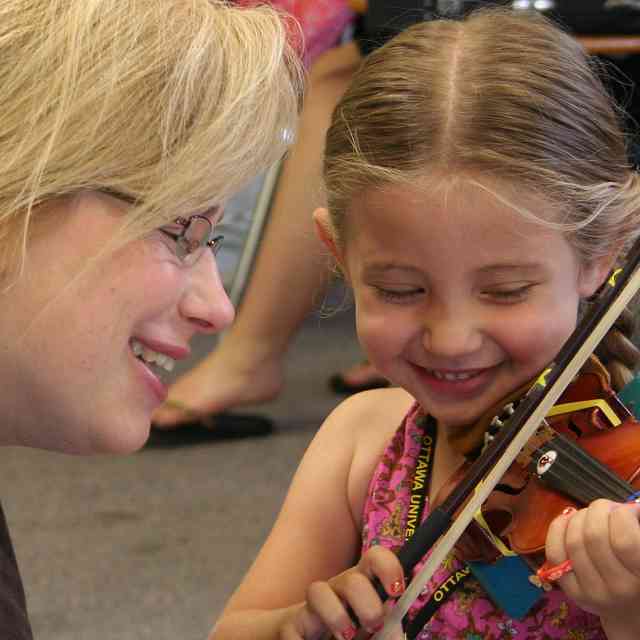From the Video Series Parents As Partners Online 2015
A few weeks ago I received a text message from my brother (Suzuki parent with 3 children) It read “I know every child can, but I am not sure that this parent can.” Have you ever felt like that? I know that I have.
The biggest challenge faced by the Suzuki method is that we no longer live in the 1950’s. When the method began, most families were single income and one parent stayed at home to care for the house, the children, and of course practice. My brother hit the nail right on the head: every child can, but can every parent? It is not a question of ability or desire, it is a question of time.
I asked a few families in my studio and I found most of them looked like this: somewhere around 7:00 or 7:15am the parents left for work and the children left for school. One parent and children would return at best case around 4:30 and often not until 5:30 or 6:00 at night. At this point, by the time they arrived home the family had been away from the house for ten or twelve hours, they were tired and hungry and there is still homework to be done. Supper had to eaten, cleaned up after, laundry done and that was the best case scenario if traffic wasn’t bad. Then there are the lessons to get to and the swimming to go to and one other physical activity for the week. Now when should this typical family practice in order to achieve 7 days a week? What should they cut out of their lives? There is really nothing to cut.
Perhaps this schedule sounds familiar. Maybe even a little bit like yours. If so, I would like to share some ideas with you that have helped the families in my studio.
First, write out your schedule. Try to schedule your music lessons on the same day if possible.
Second, are there any parts of the practice that the child can do independently? Bow holds in the car or in the kitchen while you cook? Can they review with the recording while you prepare supper? Talk to your teacher and have them assign independent tasks your child is ready for.
Third, adjust expectations. Consult with your teacher, let them know if you as a parent can only do 4 days a week. Ask them if the child can practice and review on their own the other 3 days for just 5 minutes.
Hire a practice sitter. Is there an older student that the teacher can recommend to practice with your child once or twice a week when you cannot?
Write out family schedule and put in practice time and see where you are at. Don’t give up on 7 days of practice a week. Set an alarm for practice time, because if you just decide to do it after cleaning the house, I have bad news, the house can always take more cleaning and you have to decide to stop cleaning and start practicing.
The next step is super efficient, focused practice. If you aren’t sure how to do this, ask your teacher. If they can recommend for you a parent and child team who does especially effective practice and watch and learn.
Last and most important: Constant, honest communication with your teacher about how the week went. If there was a school program and a PTA meeting, and you were sick one day, and only three practice sessions occurred. Parents let me know these things at the beginning of the lessons so I can adjust my teaching and my expectations for that lesson.
In my lessons we are constantly evaluating if we are making the most of the limited time available to each family.
The final key for today’s busy family came in the form of an article that I recently read. It went something like this:
I asked my child, “Do you enjoy practicing?” He looked confused. “Not really.” he said. So I asked him, “Do you not like to practice?” “No” he said, “I don’t really mind practicing.” His response was much the same as if I had asked him if he enjoyed doing his math homework or if he wanted to quit math because he didn’t like it. It is not an option, it is just part of his day, so he never really considers whether or not he likes to practice.
We have come to treat music lessons as if they are optional. If our child doesn’t like them, we can quit. If we don’t have time as the parents, that is what can be cut out of our schedules. If the budget it too tight, cut the music lessons. If music is optional, the parent and the child will come to treat it as optional.
So the first question you must ask yourself in order to find out if you, as the parent, can is: are music lessons optional for your family? If the answer is “yes,” then you will struggle in the practice room. But if the answer is “no,” and both you and your child know it, then both you and your child will immediately become easier.
Make a list of the things you want your child to learn through music. Things like focus, determination, perseverance, self confidence, joy, respect to name just a few. Then ask yourself, where else will my child learn these skills? And if music is the best place to do that, then it truly is part of their education.
The second question is, how long should the education go on? Eventually, even if we don’t want to, we all have to quit music lessons. As a five year old, I begged my parents for violin lessons. So my mother sat me down and said, in our family, we don’t quit. If you want to take violin lessons, you have to take every week and you have to practice every day until you’re in 8th grade. Should we start? And I enthusiastically said yes let’s do it!
Now, lest you think I was an angel to practice with, I know that on at least one occasion, maybe more, it took both parents to practice with me. One to discipline, the other to practice, but it never occurred to me that we would not practice. When I graduated from 8th grade, my mother said, likely with a bit of relief, “ Ok, you can quit violin now.” My reply, “Are you kidding me? I just got good at this!”
The third thing you need to realize as a parent is that arguments are not about the violin. When your child is pushing back in the practice room, it has to do with their relationship with you. Practice just happens to be the time they have your undivided attention. The practice room is the place where boundaries are defined, independence is tried, and buttons are pushed. The instrument is merely the vehicle used to see if the rules really do apply. As a busy parent, the decision to practice is the decision to hammer out your relationship with your child. Realize that if they don’t work out those boundaries now, the only other option is later. Think “teenager”—and get into the practice room.
The reality was, I loved practicing with my mother, but I didn’t always act like it. Here’s the other thing—I don’t remember those bad practice sessions. I only remember the good ones. As a parent, I realized I needed to offer that same bit of grace towards my child. When I approach the practice room, I take time to remember a good practice, where technique was improved, the relationship between the two of us was positive and music was appreciated. As a parent, if I go in with an attitude of dread, stress or short on time, I have created a self fulfilling prophecy.
Our biggest strength in the Suzuki method, I believe, is that we are not living in the 1950’s. Today, more than ever, families need to have a reason to spend time together, away from the computer, and work, and the hectic life. The opportunity to be required to spend 30 minutes a day with your child as part of their education is a blessing, even though sometimes it is very well disguised.
So, can every parent? Make a schedule, make a decision that music education is not optional, communicate with your teacher, hire a practice sitter, take a deep breath, think positively, think of your child as a teenager, and go for it.
I am a Suzuki parent, and I happen to believe that every parent can.






